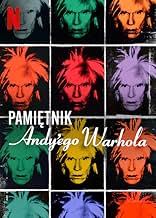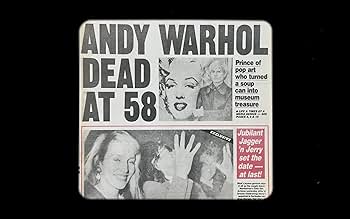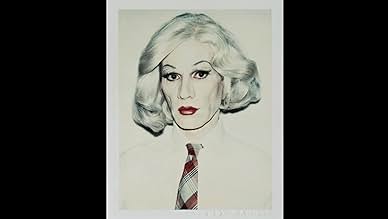IMDb-BEWERTUNG
7,7/10
2913
IHRE BEWERTUNG
Als Andy Warhol im Jahr 1968 angeschossen wird, beginnt er mit der Aufzeichnung seines Lebens und seiner Gefühle. In dieser Serie werden seine Geheimnisse enthüllt.Als Andy Warhol im Jahr 1968 angeschossen wird, beginnt er mit der Aufzeichnung seines Lebens und seiner Gefühle. In dieser Serie werden seine Geheimnisse enthüllt.Als Andy Warhol im Jahr 1968 angeschossen wird, beginnt er mit der Aufzeichnung seines Lebens und seiner Gefühle. In dieser Serie werden seine Geheimnisse enthüllt.
- Für 4 Primetime Emmys nominiert
- 2 Gewinne & 9 Nominierungen insgesamt
Folgen durchsuchen
Empfohlene Bewertungen
10stevipp
Annoyed by the reviews putting this down. What planet are they all on?! 10 stars to this series. This is such a tender portrayal of his life and loves. There was much I did not know about him. The images bring his world to life and capture, with fleeting images, snippets and moments in time. A marvel of editing. I found this moving and hypnotic.
Wonderful.
Wonderful.
I had no idea about Warhol's life except for his pop and Campbell's art. This documentary shows the human side of the artist. His weakness, fears, insecurities for which his only outlet would've been his art. Like most people in the industry, his brilliance had a price to pay. I respect his art, even though I am not a fan I watched this with an open mind and learned so much more.
A class act on all fronts.
First of all, from the credits on in, it looks sumptuous. The use of digital technology is far more aesthetically sophisticated than pretty much anything I'm seeing from Hollywood and shows, like only one or two other films I'm aware of (the neo Giallo 'Amer' is one) that digital at its best can make a vital, valuable contribution to movie imagery. We even get a sort of implicit origin story for all this in a couple of clips of Warhol trying early computer drawing programmes, once with instruction from Steve Jobs. The leap from that to this doc is something like that from kid's drawing to the high Renaissance. Here, the tech is used to seamlessly weave together an extraordinarily rich array of filmed source material available on Warhol with modern-day interviews and give the whole a lushness at least equal to that of film.
The digital finishing touch: with the permission of the Andy Warhol Foundation, Warhol's voice has been computer simulated to read the diaries - and just as the computerised imagery achieves warmth, the voice, the seeming summa of Warhol's stated desire to become a machine, has a surprisingly human quality, its hint of melancholy entirely right for the diaries.
This little irony of Warhol finally becoming a machine but the machine achieving feeling is almost a metaphor for the story being told here, for the likely discovery of what being a machine meant to Warhol as a man. In an almost aggressively gleeful flouting of Barthes' 'Death of the Author,' the doc is primarily about Warhol's personal life, especially his long-term love relationships with men. Excellent as Barthes' argument is in many ways, we might note at this point that he was himself a gay man in a homophobic time, who may have had his own reasons for wanting to keep the author's biography in the shadows.
This is the question being asked here: how much was Warhol's brilliantly constructed artistic persona - machinelike, detached, asexual - born of a need to hide or at least make palatable his homosexuality? As discussed here, this is not a reductive question. It more than allows for the fact that, as all art is artifice, the need to veil certain messages can actually enrich the work, and also for Warhol's work still to be read through other lenses. Nevertheless, given the way the persona played itself out in the work, I think the series makes an incredibly strong argument that this is a question, and an area of his biography, that Warhol scholarship cannot ignore, that the personal likely mattered to the work even in terms of the way it was hidden by the work.
Fortunately, for the filmmakers and the viewers, it also, by its nature, makes for a fascinating, touching human story.
First of all, from the credits on in, it looks sumptuous. The use of digital technology is far more aesthetically sophisticated than pretty much anything I'm seeing from Hollywood and shows, like only one or two other films I'm aware of (the neo Giallo 'Amer' is one) that digital at its best can make a vital, valuable contribution to movie imagery. We even get a sort of implicit origin story for all this in a couple of clips of Warhol trying early computer drawing programmes, once with instruction from Steve Jobs. The leap from that to this doc is something like that from kid's drawing to the high Renaissance. Here, the tech is used to seamlessly weave together an extraordinarily rich array of filmed source material available on Warhol with modern-day interviews and give the whole a lushness at least equal to that of film.
The digital finishing touch: with the permission of the Andy Warhol Foundation, Warhol's voice has been computer simulated to read the diaries - and just as the computerised imagery achieves warmth, the voice, the seeming summa of Warhol's stated desire to become a machine, has a surprisingly human quality, its hint of melancholy entirely right for the diaries.
This little irony of Warhol finally becoming a machine but the machine achieving feeling is almost a metaphor for the story being told here, for the likely discovery of what being a machine meant to Warhol as a man. In an almost aggressively gleeful flouting of Barthes' 'Death of the Author,' the doc is primarily about Warhol's personal life, especially his long-term love relationships with men. Excellent as Barthes' argument is in many ways, we might note at this point that he was himself a gay man in a homophobic time, who may have had his own reasons for wanting to keep the author's biography in the shadows.
This is the question being asked here: how much was Warhol's brilliantly constructed artistic persona - machinelike, detached, asexual - born of a need to hide or at least make palatable his homosexuality? As discussed here, this is not a reductive question. It more than allows for the fact that, as all art is artifice, the need to veil certain messages can actually enrich the work, and also for Warhol's work still to be read through other lenses. Nevertheless, given the way the persona played itself out in the work, I think the series makes an incredibly strong argument that this is a question, and an area of his biography, that Warhol scholarship cannot ignore, that the personal likely mattered to the work even in terms of the way it was hidden by the work.
Fortunately, for the filmmakers and the viewers, it also, by its nature, makes for a fascinating, touching human story.
Didn't particularly like the first few episodes, but I enjoyed the last few ones, so hang in there. This is a wonderful, insightful, profound and entertaining biopic. Plus the majority of his friends, friends, are alive to provide insight and interpretations to his diary entries, wonderfully narrated.
Amazing how prophetic and influential his work and life are to our current era. He was the original "selfie, marketeer, and social influencer." He took fotos and video of all his events, work, social and intimate activities. In fact, it is commented what craziness he would have creative had lived he in the current social media age.
Amazing how prophetic and influential his work and life are to our current era. He was the original "selfie, marketeer, and social influencer." He took fotos and video of all his events, work, social and intimate activities. In fact, it is commented what craziness he would have creative had lived he in the current social media age.
Unless you are or were a hard-core fan of Andy Warhol, you (like most of us) probably have a preconceived notion of who Warhol was. To most people, he was the weird looking guy with the bad wig who painted a bunch of Campbell soup cans. This documentary blows the lid off of any and most perceptions people had of Warhol.
I think for the most part Warhol was his own creation of who he wanted the world to think he was, i.e., eccentric, reclusive, lonely, fly-on-the-wall persona who created an almost completely new genre of modern art. He would used this self-creation to at once achieve what he most wanted (wealth and fame) while simultaneously retreating from the spotlight when it suited his purpose.
This doc peels all of the layers off of the facade. What we see is a man who was at times a social butterfly, one who craved affection just like any other person, one who fell in love and had his heart broken when the love affairs dissolved and partook in everyday activities just like the common man.
To me, two of the most startling things I found out were that Warhol was on 'The Love Boat' and he fell off of the back of a snowmobile. I was literally gob smacked.
As an added bonus, this movie is a must see for anyone who wants to know what NYC was like before, during and after the Aids epidemic. It's devastation is revisited in gut-wrenching fashion.
I highly recommend this series if you have even a passing interest in art and the life of one of the greatest modern painters of a generation.
I think for the most part Warhol was his own creation of who he wanted the world to think he was, i.e., eccentric, reclusive, lonely, fly-on-the-wall persona who created an almost completely new genre of modern art. He would used this self-creation to at once achieve what he most wanted (wealth and fame) while simultaneously retreating from the spotlight when it suited his purpose.
This doc peels all of the layers off of the facade. What we see is a man who was at times a social butterfly, one who craved affection just like any other person, one who fell in love and had his heart broken when the love affairs dissolved and partook in everyday activities just like the common man.
To me, two of the most startling things I found out were that Warhol was on 'The Love Boat' and he fell off of the back of a snowmobile. I was literally gob smacked.
As an added bonus, this movie is a must see for anyone who wants to know what NYC was like before, during and after the Aids epidemic. It's devastation is revisited in gut-wrenching fashion.
I highly recommend this series if you have even a passing interest in art and the life of one of the greatest modern painters of a generation.
Wusstest du schon
- WissenswertesA voice cloning technology called "Resemble AI" was used to recreate Andy Warhol's voice. Director Andrew Rossi explained that it stemmed from Warhol's desire to be emotionless like a machine.
Top-Auswahl
Melde dich zum Bewerten an und greife auf die Watchlist für personalisierte Empfehlungen zu.
- How many seasons does The Andy Warhol Diaries have?Powered by Alexa
Details
- Erscheinungsdatum
- Herkunftsland
- Offizielle Standorte
- Sprache
- Auch bekannt als
- مذكّرات آندي وارهول
- Weitere beteiligte Unternehmen bei IMDbPro anzeigen
- Laufzeit1 Stunde
- Sound-Mix
- Seitenverhältnis
- 16:9 HD
Zu dieser Seite beitragen
Bearbeitung vorschlagen oder fehlenden Inhalt hinzufügen






































